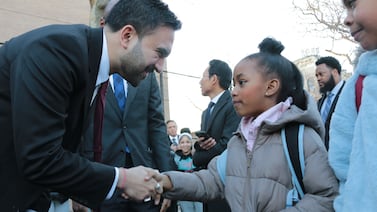Sign up for Chalkbeat Detroit’s free daily newsletter to keep up with the city’s public school system and Michigan education policy.
The Detroit teachers union overwhelmingly approved a new two-year contract with Detroit Public Schools Community District on Saturday, the first time in nearly three decades that the union has ratified a contract before the start of the school year.
More than 1,100 members of the Detroit Federation of Teachers voted in the election with 83% approving the contract, a nearly 10% increase in approval compared to the previous agreement.
The contract is under wraps until the school board officially votes to approve it in the coming days, but union leaders are celebrating several new benefits, including a provision to create private spaces for nursing mothers, the addition of gender-neutral bathrooms in every district school, and an expanded salary schedule that maxes out at $90,000 for a teacher with a master’s degree. Teachers at that level were making $86,000 under the old contract.
The salary schedule could result in pay increases from $2,400 to $11,000, union president Lakia Wilson-Lumpkins told Chalkbeat.
The union sees these wins as pivotal steps in improving the district’s climate and culture — a mission central to the district under Superintendent Nikolai Vitti — and attracting and retaining teachers amid a national educator shortage hurting classrooms statewide, Wilson-Lumpkins said.
School board member Sherry Gay-Dagnogo, a former district teacher, said she was happy for her “fellow DFT allies.” She sees the agreement as a win not only for teachers, but also the district more broadly, especially when it comes to teacher retention.
Higher teacher pay, she said, will make the district “competitive with contiguous districts seeking to poach our staff.”
The contract acknowledges the shortage of non-teaching support staff who work with special education students, including speech pathologists, social workers, and occupational therapists. Wilson-Lumpkins said Vitti approved a bonus for those staff members ranging from $2,500 to $15,000.
The new terms also codify performance and schoolwide bonuses related to instruction around improving literacy through initiatives funded by the $94.4 million literacy lawsuit.
This contract marks the first time in more than a decade that the union could negotiate key bargaining rights restored by the Michigan Legislature last summer. When the district was under state emergency management, those rights “were ripped away from us,” Wilson-Lumpkins said.
Now teachers have clarity on processes such as layoffs, recalls, and transfers.
The return of payroll-deducted union dues is another “huge, huge win,” Wilson-Lumpkins said.
The previous exclusion of payroll-deducted union dues was a discriminatory state policy targeting K-12 educators, she said. “It was an attempt to weaken our strength and limit our membership,” she said. The Michigan Legislature repealed the 2013 law last year.
Union leaders said much of the language they wrote around these restored teachers’ rights could serve as a model for other districts.
“We have put our arms around all of the language that was previously prohibited,” Wilson-Lumpkins said. “Every school district in the state of Michigan is going to have to cross this bridge at some point … we have walked that bridge.”
Roughly 4,500 people belong to the Detroit Federation of Teachers, including educators, academic interventionists, counselors, psychologists, social workers, speech therapists, and attendance agents.
Robyn Vincent is a reporter for Chalkbeat Detroit, covering Detroit schools and Michigan education policy. You can reach her at rvincent@chalkbeat.org.






